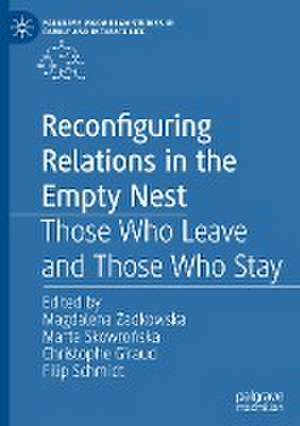Reconfiguring Relations in the Empty Nest: Those Who Leave and Those Who Stay: Palgrave Macmillan Studies in Family and Intimate Life
Editat de Magdalena Żadkowska, Marta Skowrońska, Christophe Giraud, Filip Schmidten Limba Engleză Hardback – 21 feb 2024
Din seria Palgrave Macmillan Studies in Family and Intimate Life
-
 Preț: 389.88 lei
Preț: 389.88 lei - 15%
 Preț: 642.83 lei
Preț: 642.83 lei -
 Preț: 391.61 lei
Preț: 391.61 lei -
 Preț: 388.72 lei
Preț: 388.72 lei -
 Preț: 388.13 lei
Preț: 388.13 lei -
 Preț: 388.72 lei
Preț: 388.72 lei - 15%
 Preț: 640.71 lei
Preț: 640.71 lei -
 Preț: 391.02 lei
Preț: 391.02 lei - 15%
 Preț: 700.94 lei
Preț: 700.94 lei -
 Preț: 389.88 lei
Preț: 389.88 lei -
 Preț: 387.75 lei
Preț: 387.75 lei -
 Preț: 396.40 lei
Preț: 396.40 lei -
 Preț: 394.12 lei
Preț: 394.12 lei -
 Preț: 382.18 lei
Preț: 382.18 lei -
 Preț: 388.72 lei
Preț: 388.72 lei -
 Preț: 387.38 lei
Preț: 387.38 lei - 15%
 Preț: 702.24 lei
Preț: 702.24 lei -
 Preț: 390.93 lei
Preț: 390.93 lei -
 Preț: 386.81 lei
Preț: 386.81 lei -
 Preț: 388.72 lei
Preț: 388.72 lei - 15%
 Preț: 640.88 lei
Preț: 640.88 lei -
 Preț: 389.70 lei
Preț: 389.70 lei -
 Preț: 386.39 lei
Preț: 386.39 lei -
 Preț: 388.13 lei
Preț: 388.13 lei - 15%
 Preț: 643.34 lei
Preț: 643.34 lei - 15%
 Preț: 585.73 lei
Preț: 585.73 lei -
 Preț: 392.60 lei
Preț: 392.60 lei -
 Preț: 386.81 lei
Preț: 386.81 lei -
 Preț: 381.00 lei
Preț: 381.00 lei -
 Preț: 392.60 lei
Preț: 392.60 lei -
 Preț: 387.58 lei
Preț: 387.58 lei -
 Preț: 382.95 lei
Preț: 382.95 lei -
 Preț: 385.62 lei
Preț: 385.62 lei -
 Preț: 392.60 lei
Preț: 392.60 lei -
 Preț: 386.81 lei
Preț: 386.81 lei -
 Preț: 390.08 lei
Preț: 390.08 lei -
 Preț: 389.11 lei
Preț: 389.11 lei - 15%
 Preț: 589.02 lei
Preț: 589.02 lei -
 Preț: 387.20 lei
Preț: 387.20 lei - 15%
 Preț: 584.43 lei
Preț: 584.43 lei -
 Preț: 391.61 lei
Preț: 391.61 lei - 15%
 Preț: 582.80 lei
Preț: 582.80 lei -
 Preț: 392.60 lei
Preț: 392.60 lei -
 Preț: 386.81 lei
Preț: 386.81 lei -
 Preț: 388.72 lei
Preț: 388.72 lei -
 Preț: 389.70 lei
Preț: 389.70 lei
Preț: 895.76 lei
Preț vechi: 1092.39 lei
-18% Nou
Puncte Express: 1344
Preț estimativ în valută:
171.42€ • 186.14$ • 143.100£
171.42€ • 186.14$ • 143.100£
Carte tipărită la comandă
Livrare economică 23 aprilie-07 mai
Preluare comenzi: 021 569.72.76
Specificații
ISBN-13: 9783031504020
ISBN-10: 303150402X
Pagini: 340
Ilustrații: XVII, 340 p. 5 illus.
Dimensiuni: 148 x 210 mm
Greutate: 0.58 kg
Ediția:2024
Editura: Springer Nature Switzerland
Colecția Palgrave Macmillan
Seria Palgrave Macmillan Studies in Family and Intimate Life
Locul publicării:Cham, Switzerland
ISBN-10: 303150402X
Pagini: 340
Ilustrații: XVII, 340 p. 5 illus.
Dimensiuni: 148 x 210 mm
Greutate: 0.58 kg
Ediția:2024
Editura: Springer Nature Switzerland
Colecția Palgrave Macmillan
Seria Palgrave Macmillan Studies in Family and Intimate Life
Locul publicării:Cham, Switzerland
Cuprins
1: Introduction.- Part 1: Family in the Empty Nest.- 2: Mothering from Full Nest to Empty Nest.- 3: Fathering from Full Nest to Empty Nest.- 4: Adult Children's Bedrooms and Emptying the Nest: The Mechanisms of Transition.- 5: Visiting Parents: The Recomposing and Renegotiation of Family Roles and Responsibilities.- 6: The Come-Back to 'Full Nest' in Times of Pandemic in France and Poland.- 7: The Recomposition: Parental Roles and Animal Roles in the Empty Nest.- Part 2: Couple in the Empty Nest
8: Redefining Couple Relationship in the Empty Nest: The Evolving Involvement.- 9: Redefining Couple Relationship in the Empty Nest: Together, but Apart.- 10: No Intimate Bonds in the Empty Nest: Uncoupling and Recoupling.- Part 3: The Self in the Empty Nest.- 11: What Do We Do In Our Free Time? Personal Life Strategies.- 12: Without Children at Home: The Transition to Herplaces and Hisplaces.- 13: Changing Roles, Changing Emotions: Women's Emotions in Coping with Change.- 14: Struggling with Limitations, Creating New Possibilities: The Identity of Men in the Empty Nest Stage.- 15: Conclusion.
Notă biografică
Magdalena Żadkowska is Assistant Professor in the Division of Sociology of Everyday Life in the Faculty of Social Sciences at University of Gdańsk, Poland.
Marta Skowrońska is Assistant Professor at the Division of Social Practice Research and Theory in the Faculty of Sociology at Adam Mickiewicz University, Poland.
Christophe Giraud is Professor of Sociology at Université Paris Cité, France.
Marta Skowrońska is Assistant Professor at the Division of Social Practice Research and Theory in the Faculty of Sociology at Adam Mickiewicz University, Poland.
Christophe Giraud is Professor of Sociology at Université Paris Cité, France.
Filip Schmidt is Assistant Professor in the Division of Social Practice Research and Theory at the Faculty of Sociology at Adam Mickiewicz University, Poland. ctice Research and Theory at the Faculty of Sociology at Adam Mickiewicz University, Poland.
Textul de pe ultima copertă
This edited volume traverses the spectrum of experiences that take place after children leave the family home and parents find themselves in the "empty nest" stage of life. Rather than focusing on measuring the intensity of empty nest syndrome or asking whether parents' marital satisfaction increases or decreases in this phase, the authors present rich qualitative data from across Poland and France to show that there is great variation in how families experience the empty nest, developing both a study on intimacy and love and on family solidarity. Throughout the book, themes of mixed emotions, nuanced attitudes, contradictions, and dissonance are explored while shedding light on "supporting actors" of the empty nest transition, such as family pets and material objects.
Caracteristici
Focuses on both the roles of being a parent and being a spouse in the empty nest Illustrates how families experiencing this lifecourse transition are influenced by political and cultural context Features data from eight waves of qualitative studies including more than 250 in-depth interviews
